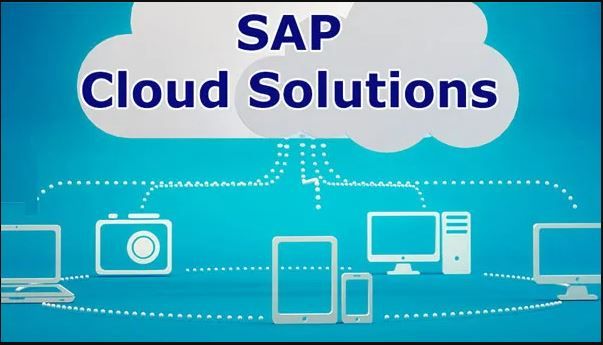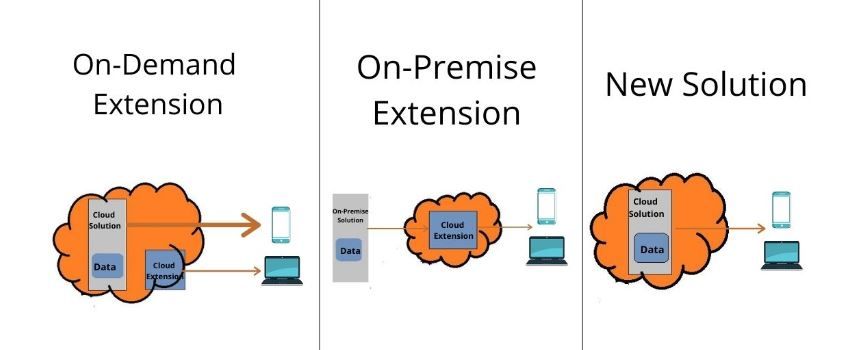SAP Cloud
The SAP Cloud Platform was previously called the SAP HANA Cloud Platform. SAP launched this platform for companies to develop and deploy applications. It is a Platform as a Service (PaaS) product, companies can integrate them with both cloud and on-premise environments.
The SAP Cloud Platform has many outstanding functionalities. These include integration, security, collaboration, and analytics. In this article, we will take a look at the key features, functionalities, benefits, and other details about the SAP Cloud platform.
What is SAP Cloud Platform?
The SAP Cloud platform is based on the in-memory database technology of SAP HANA. This lets developers, startups, and software vendors create HANA based applications. The software was developed by SAP to let companies extend their ERP applications with modern technology. These technologies include analytics and machine learning.
Moreover, you can integrate the SAP Cloud Platform with SAP applications. You can also integrate internal software solutions and 3rd party apps. With a partnership with Apple Inc. and an iOS SDK, developers can now create and run iOS apps on the SAP Cloud Platform.
Furthermore, the SAP Cloud platform is great for both small and big software projects. And not only that, the apps built here can be customized according to the client’s needs.
History of SAP HANA Cloud
The SAP Cloud Platform was launched as SAP NetWeaver Cloud on October 16, 2012. This belonged to the SAP HANA Cloud portfolio. On May 13, 2013, the platform was re-launched as the SAP HANA Cloud Platform. This laid the foundation for SAP business products, such as the SAP BusinessObjects Cloud. Since then, the software has evolved. Now, the SAP Cloud Platform has more than 4000 customers and 500 business partners.
On February 27, 2017, the SAP HANA Cloud Platform was re-titled as the SAP Cloud Platform.
Different Scenarios on SAP Cloud Platform
SAP Cloud platform is used for the following scenarios –
1) On-Demand Extension
In this scenario, the existing SAP Cloud Applications are integrated and extended with custom extensions. These may be running in the cloud as well.
2) On-Premise Extension
This scenario is well-suited for companies that have invested in their on-premise IT infrastructure. Here, existing apps running on the data center can be extended with custom cloud extensions. Moreover, new extensions can be developed on the cloud which can be integrated with on-premise solutions. For this, the Connectivity Service and Cloud Connector will be required.
This solution is also known as a Hybrid Solution.
3) New Solution
This scenario involves developing new cloud applications for customers. The learning curve for these apps is low and investment for software/ hardware is also low.
Services of SAP HANA Cloud Platform
The SAP HANA Cloud platform provides two primary levels of functionality. These are - Application Service and Database Service.
SAP HANA Cloud Platform as an Application Service
The Application Service offers the following functionalities –
- Mobile-Services – A cloud mobile platform is offered where you can avail of mobile applications
- Portal – This allows companies to create and work with live websites that are mobile-friendly. This portal also brings together cloud solutions and in-house software solutions. Employees can also access them
- Integration– This lets on-premise systems integrate with cloud environments
- Data Analytics – This lets users analyze and present data using visualizations. Using this, users can get a clear insight into the data stored on the platform and get real-time analysis results
- Security – This feature offers high security while creating user accounts. It ensures data privacy, authorized access, and system integration
- Collaboration – Enables users to share information on the platform. This feature enhances the communication and operational efficiency of employees working on a project
SAP Cloud Platform SDK for iOS
As mentioned earlier, the SAP Cloud platform offers an SDK for creating iOS applications. This lets developers build apps for Apple devices such as iPhone and iPad. The speciality of these apps is that they can integrate data from the back-end ERP applications to the front-end of the iOS.
The Apple Swift programming language is used for coding the applications. The SDK also comes with useful features. These are libraries for UX components, iOS device capabilities such as location services, notifications, and Touch ID.
SAP HANA Cloud Platform as a Database Service
The Database services offered by the SAP Cloud platform are –
- Transactions – The platform stores transactional data in real-time. This data can be fetched when required
- Streaming – This platform works as a portal for data streaming, processing. You can also analyze data sets
- Analytics – You can analyze data in real-time using in-built and external algorithms. Textual data can be analyzed, be it structured or unstructured data
- Spatial– This offers data visualization capabilities
The SAP Cloud Database Service enables companies to process business data in real-time. Using advanced analytics, companies gain better insights into their data. This aids them to make faster decisions. Moreover, this platform lets you integrate all your data stored in ERP systems in a single place.
Additionally, this data is completely safe due to the advanced security features.
Advantages of SAP Cloud Platform
The major benefits of using SAP Cloud Platform are –
- It offers many features for building, managing and executing cloud-based ERP applications. These apps can run with your SAP or non-SAP solutions
- Offers smooth integration with the core SAP systems and SaaS offerings
- Implementing projects outside the core SAP ERP system is easy
- Developing cloud projects on this platform is fast and simple. You can do this with the help of in-built components and integrated functions
- Developers can use their ABAP knowledge along with DevOps principles to build native applications. Or, they can use the Cloud Application Programming Model to focus more on business logic for the apps
- It has pre-built tools and open programming This leads to better productivity for programmers
- Managing APIs is easy, be it containerized solutions or legacy systems. This enhances the business life cycle management
- It comes with extensive SDKs for developers to create tailor-made need-specific user interfaces for users. These interfaces are accessible on smart-phones and PCs
Why does your business need SAP Cloud Platform?
The SAP Cloud platform provides any organization with a solid technical foundation that enhances their business growth. Here are some reasons why every business must choose the SAP Cloud platform –
Extending cloud and on-premise applications and making the company AGILE
Companies can extend their existing cloud apps with new features. These can be personalized as per business goals and customer requirements. Furthermore, these apps can be converted into mobile-friendly applications for employees, users, and partners.
The pre-built app extensions will help in enhancing the quality of services offered by the firm.
Integrate apps with data and optimize business processes
Your applications, business processes, and data can all be connected, irrespective of who built them or where the apps were deployed. Also, you can integrate on-premise apps with cloud applications to create hybrid cloud apps. These apps may contain real-time data and even streams.
Use innovative technologies to strengthen business
With innovative applications, companies can achieve more business goals and attract new customers. Technology innovation also opens up new boundaries for business expansion. As one of the technologies that power the SAP platform is the Internet of Things, connecting your apps, fleet, and assets is easy.
SAP Cloud Platform Pricing
There are 2 business models through which you can purchase SAP Cloud Platform –
- Consumption-based pricing
This model is also called SAP Cloud Platform Enterprise Agreement. This flexible model allows you to access all service if this platform and configure into your global account. You use the services as per your project requirements, and pay for only what you use.
- Subscription-based pricing
This model lets you choose a set of services for a fixed price. It includes the services you will need for your project. This will be added to your global account as present entitlements. Then, if you want to modify the services or add new ones, visit the SAP store or get in touch with the SAP sales representative.
Read Here: SAP Cloud Platform Pricing Information
SAP Cloud Certification Basic Requirements
SAP offers many cloud certifications for –
- Associates
- Specialists
- Professionals
- Service-level certifications
For your vendor’s SAP certification, they need to be certified in Hosting Services, SAP HANA Operations, and Cloud Operations. Being SAP certification requirements include an SAP hosting partnership, regular SAP audits, and fulfilling specific technical standards. The hosting partner has to be SAP-certified to deliver the Service Level Agreements to fulfil all your business requirements.
Conclusion
SAP Cloud Platform offers a world-class portal for developing, integrating, and deploying a variety of applications. The innovative functionalities enable software developers to execute all this in less time. This enhances ROI and decreases costs, and the companies can use this amount to invest in other business avenues.
Other Useful Resources
Tutorials
 Use and Customize totals in SAP Analytics Cloud
Use and Customize totals in SAP Analytics Cloud
How to use and customize totals in SAP Analytics Cloud?SOLUTIONPlease follow the steps below in order to use and customize totals in SAP Analytics Cloud:1) First, browse to the Story and Table where y ...- Create Average ignoring NULLs & 0s in SAP Analytics Cloud
How to create Average which ignores NULLs & 0s in SAP Analytics Cloud (SAC)? Hello SAP Experts, I want to create an Average in SAP Analytics Cloud which ignores all NULLs and 0s. Pl ...  Advantages and Disadvantages of Cloud Computing
Advantages and Disadvantages of Cloud Computing
Cloud computing is one of the most talked-about technologies in the world right now. With more and more companies switching to cloud computing every passing day, it has become an integral part of the ...- Login failed for user 'SA'" Error in SQL Server
The error Login failed for user 'SA' frequently occurs when trying to establish a connection to a SQL Server database. In SQL Server, the 'SA' (System Administrator) account is th ...

